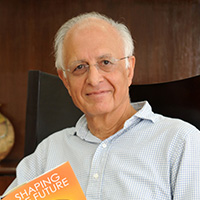
Two questions are being asked with increasing frequency both in India and around the world. Is our pattern of economic growth sustainable? And fair? It is clear that a new approach is required for human development and societal progress in order to mitigate the prevalent risks to the environment and social harmony. Dennis J. Snower, Professor of Macroeconomics and Sustainability at the Hertie School of Governance, Berlin; Senior Research Fellow of the Blavatnik School of Governance, Oxford University and President of the Global Solutions Initiative, which provides policy advice to the G20, feels economics is reaching its “Copernican” Moment – the moment when it is finally becoming clear that the current ways of thinking about economic behaviour are inadequate. In conversation with former Planning Commission Member Arun Maira, Professor Snower unpacks the idea of the future of “evonomics”.
The Covid pandemic has been an enforced stress test of the health of economies, global supply chains, and the resilience of societies. It has highlighted deep structural weaknesses in them. To move from immediate recovery to a building of more resilient economies, multifaceted change for the future is essential. Many systems will have to be rebuilt simultaneously—economic systems, trade systems, and public health and education systems. The top-down leadership approach, with solutions by experts often disconnected from ground truths and people —which seems to be the default option whenever complex, large-scale problems have to be solved - is the wrong way to create resilient societies. Complex global problems require local systems solutions implemented collaboratively by communities, who act locally while keeping the big picture in mind. Therefore a new model of change and leadership is required-- a ‘firefly-up' model in which leaders facilitate better collaboration amongst stakeholders rather than direct them against their will. Adam Kahane has used this approach to help people in many countries around the world. He is a leading architect and facilitator of collaboration processes and an author of several books on the subject. Presently, he is Director of Reos Partners, a global social enterprise that helps businesses, governments, and civil society organisations work together to address complex challenges. Adam Kahane discusses a systems transformation model of governance with Arun Maira, former Member of India’s Planning Commission, a leading practitioner himself of participative systems transformation and author of several books on the subject as they both look into the time ahead.